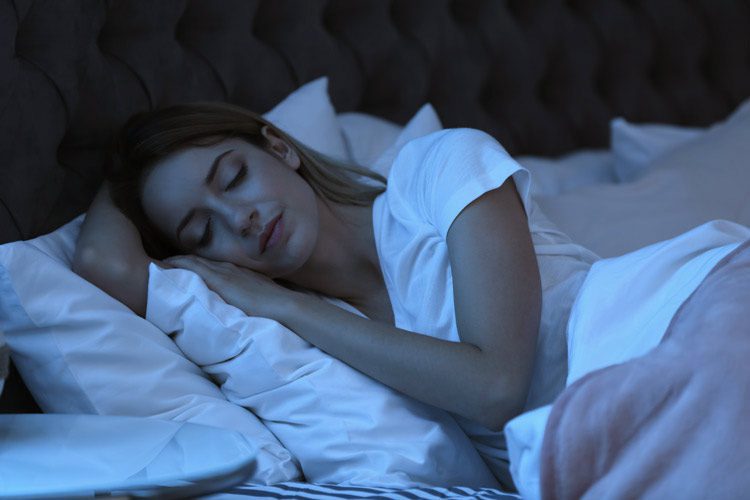It sometimes seems like the relationship between sleep and mental health is like that of the chicken and the egg. It’s not always possible to decide which came first. Sleep trouble can be an indicator of mental illness, and lack of sleep can also trigger mental health symptoms.
How Much Sleep Do We Need?
According to WebMD, if you’re an adult who is getting less than six hours of sleep per night, you’re definitely not getting enough. Some people may need more than this amount to function to their best ability.
How Does Lack of Sleep Impact Us?
There are a number of ways that humans can be negatively affected by insufficient sleep. The immediate symptoms from even a single night without sufficient sleep sound a lot like the symptoms of being under the influence of alcohol and other drugs:
- Slower thought processes
- Difficulty concentrating
- Impaired memory
- Difficulty learning
- Slowed reaction time
- Impaired judgment
For people who are in recovery from addiction, lack of sleep can also be a trigger for relapse, so it is of critical importance to their sobriety that they get adequate slumber every night. People with prolonged sleep issues have higher risk of developing:
- Depression
- Anxiety
- Heart issues
- Cancer
- Compromised immune system
- Weight gain
- Diabetes
Teenagers & Sleep
Teenagers need to spend even more time in slumber than adults, more like nine hours per night. Adolescents are also particularly hard hit by negative consequences from lack of rest. In one study, only three percent of high school students reported getting sufficient sleep, and each hour of sleep less than the recommended amount correlated with:
- 38 percent increased sadness
- 42 percent increase in suicidal ideation
- 58 percent increase in suicide attempts
- 23 percent increase in substance abuse
Sleep Trouble in Elderly Adults
Older adults have unique issues related to sleep. The commonly held belief that older adults need less sleep is a myth, but senior citizens may have more difficulty getting the sleep they need. Some factors that could be contributing to this are more common in older adults, but are also potentially treatable:
- Obstructive sleep apnea
- Circadian rhythm sleep disorders
- Chronic pain
- Restless legs syndrome
Lack of sleep in older adults can lead to:
- Daytime drowsiness
- Increased risk of falls
- Decreased quality of life
- Increased anxiety and depression
- Heightened mortality
Sleep and Mental Health: Insufficient Sleep as an Indication of Mental Illness
Getting less sleep doesn’t necessarily cause mental illness or suicidal thoughts. It can be the other way around, with mental health concerns interfering with sleep. The National Alliance on Mental Illness (NAMI) reports that lack of sleep can be indicative that the person is dealing with a mental health diagnosis already:
- Early morning wakefulness can signal depression, when seen in a person who is also experiencing low mood, decreased energy, and appetite changes.
- Lack of need for sleep can be a sign of mania when accompanied by an unexplained burst of energy.
- People with anxiety disorder or post traumatic stress disorder (PTSD) may be awakened by panic attacks or nightmares or have difficulty falling asleep.
How to Improve Your Sleep
NAMI shares a number of ways that a person can improve their chances of getting better sleep. These include:
- Forming good sleep habits
- Avoid naps or at least keep them short
- Reduce your intake of caffeine and nicotine
- Maintain a consistent routine and bedtime
- Avoid stimulating activities before bed
- Avoid alcohol, which can interfere with the ability to get REM sleep
- Keep your activities in bed limited to sleep to help your body and mind associate this location with rest
- Utilizing relaxation techniques, such as meditation, deep breathing and progressive muscle relaxation. Videos can be found on Youtube to get you started.
- Ensuring your sleep environment is:
- Cool
- Dark
- Quiet
- Furnished with a good mattress, pillow, and bedding
- Using medication as needed
- Get a medication from your doctor to help with sleep
- Reduce the amount of or change the time you take medications that could be interfering with sleep
- Utilize herbal remedies like chamomile or lavender; or use melatonin
- Practicing sleep restriction
- Exercising (just not close to bedtime)
- Cognitive-behavioral therapy (CBT)
Highland Can Help
If you are struggling to get sufficient sleep and have tried the suggestions above, it may be time to reach out for professional support. If you or a loved one are struggling with symptoms of a mental health disorder, reach out to Highland Hospital today. Our West Virginia facility offers compassionate, non-judgmental, evidence-based care.






